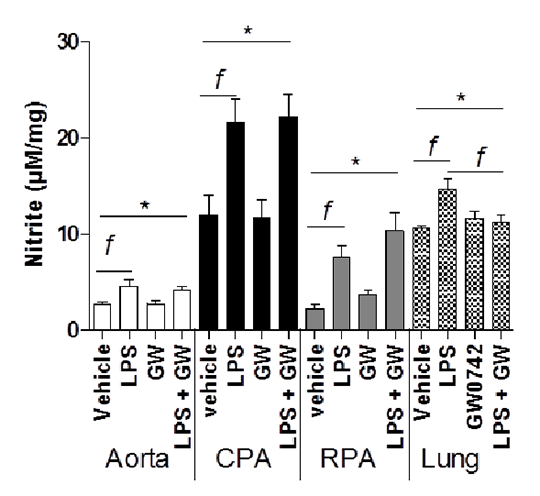Print version
Search Pub Med
The PPARβ /δ agonist GW0742 prevents LPS-induced nitrite production in rat parenchyma but not in aorta or pulmonary arteries. Peroxisome proliferator activated receptors (PPARs) are therapeutic targets in the treatment of inflammatory lung disease. The PPARβ/δ agonist GW0742 has potent anti-inflammatory effects in the vasculature (1) which has been linked to a decrease in the production of iNOS in the heart (1) and activation of Akt-eNOS in arteries (2). Here in this study we measured changes in LPS induced NO production in rat arteries and lung parenchyma. Male Wistar (300-350g) rats were killed by CO2 followed by cervical dislocation, and the aorta, conductance and resistance pulmonary arteries and lung parenchyma were dissected under sterile conditions, and placed into 24 well plates. Following incubation with 1µg/ml LPS with/without 10-7M GW0742 tissues were incubated for 24 hours, and Griess assay performed to measure nitrite production (a measure of NO release) (3). Our results show that LPS induces a significant increase in NO production from arteries and parenchyma (Figure 1). Incubation with GW0742 alone has no effect on basal nitrite levels and does not have an effect on LPS-induced NO production in all types of arteries. In comparison, GW0742 significantly reduces LPS induced NO release in lung parenchyma comparable to inhibition by 10-4M L-NAME and 10-5M 1400W.
Figure 1. 2mm rings of aorta, conductance pulmonary artery (CPS), resistance pulmonary artery (RPA) and 1mm2 lung parenchyma strips (lung) were incubated with 1ug/ml LPS ± 10-7M GW0742 in DMEM for 24 hours. Supernatant was removed and Griess assay performed to measure nitrite. Data are expressed as mean ± SEM; * and f denote p<0.05 by one way ANOVA and Tukey’s post-hoc test, respectively. In summary, incubation for 24 hours with 10-7M GW0742 significantly reduced LPS induced nitrite production in lung parenchyma but not in aorta or pulmonary arteries (conductance and resistance). These data suggest that the effects of PPARβ/δ agonists are tissue specific and might support their use as anti-inflammatory agents in lung disease. (1) Kapoor et al. (2010) Am J Respir Crit Care Med 182: 1506–1515. (2) Quintela et al. (2014) Br J Pharmacol 171: 3089–3102. (3) Stuehr D J and Nathan CF (1989) J Exptl Med 169: 1543–1555.
|


